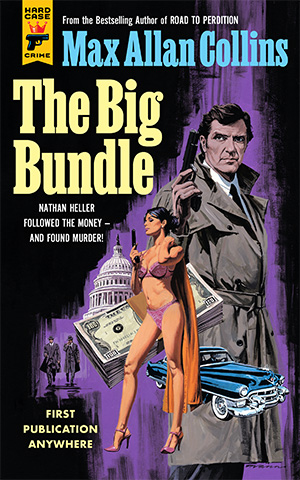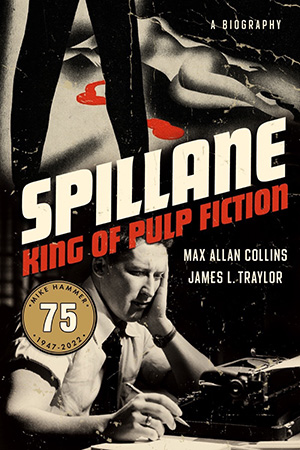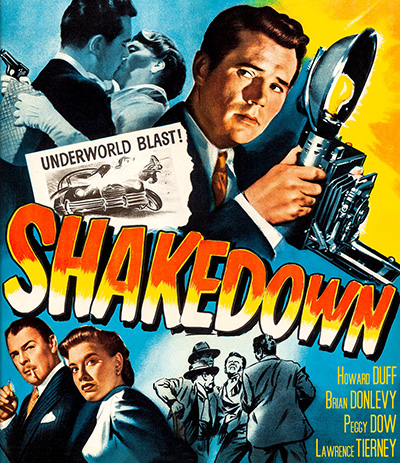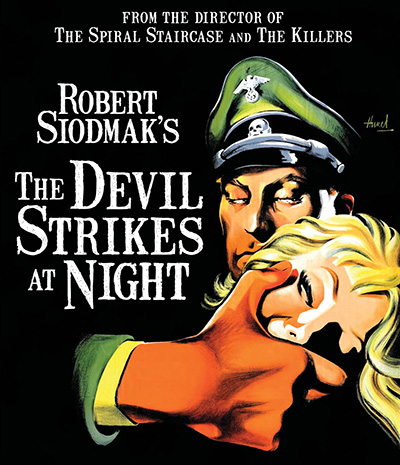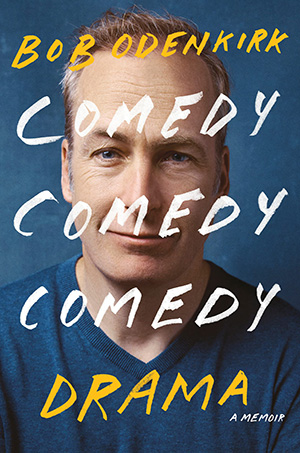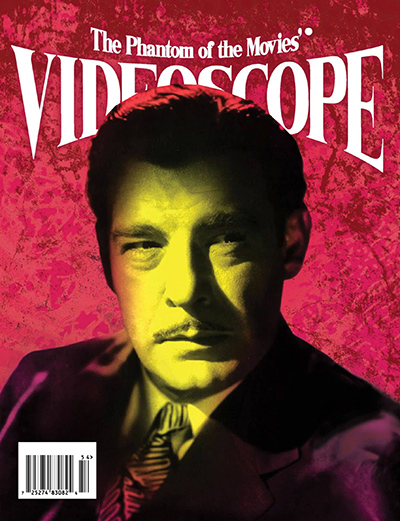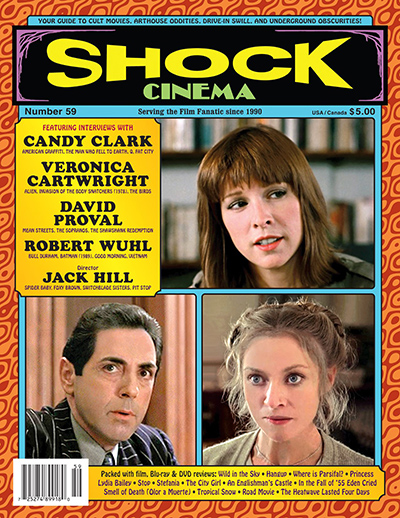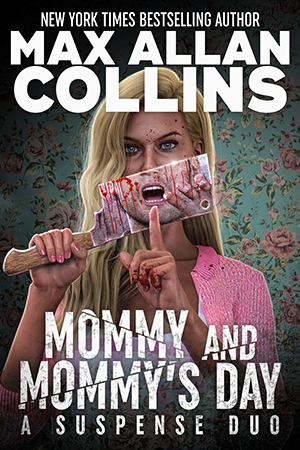Both The Big Bundle and Spillane – King of Pulp Fiction are now out and available, but I don’t seem to be getting much shelf space for either from the likes of Barnes & Noble and BAM! This despite starred reviews from Publisher’s Weekly and Booklist, and a very, very widely distributed positive review circulated by the AP. You don’t get much better press than this.
But our surviving book chains determine what they’re going to order by past sales of the author. Which does me no favors. I remain a cult author (yes, I’ll remind you that Don Westlake told me, “A cult author is seven readers short of making a living”) and these stellar reviews have arrived long after B & N and others have put in their orders.
So what is my point? If you see Bundle and/or Spillane at one of the chains, and buy it, tell the register jockey (and perhaps the help desk) that you are purchasing the last copy in the store of this very well-reviewed book. It may inspire them to order more.
What else can I do for Max Allan Collins today (a question I’m sure you ask yourself upon early rising, right after your exercise regimen)? If you won a book giveaway for either title, be sure to read the book soon and get a review in. If you are an unlucky soul who merely ponied up the dough for one of these titles at Amazon (or anywhere, really), post a review at Amazon and elsewhere if you’re truly dedicated to the cause of keeping me in business.
It is extremely undignified for me to beg, but I have never been particularly dignified. I wrote the song “Psychedlic Siren,” for Pete’s sake. But don’t think I’m complaining (though of course I am) because I am well aware of how blessed I am to have been able to avoid real work for over fifty years by telling elaborate lies known as novels and comics and film scripts. To play working man I have to reach back into bussing tables in high school and sacking groceries in college.
I don’t consider teaching “real work.” There’s not much heavy lifting in teaching, beyond lifting the aspirations of, in my case, high school graduates who hadn’t quite learned to read yet and were now in community college wondering why it’s a struggle.
I don’t mean to dis community colleges, because I believe in them wholeheartedly and think going to the first two years of a four-year college is akin to setting your future earnings on fire, till that pesky student loan is paid off, anyway (which should only take a few decades). I am back at Muscatine Community College right now, working on a project (the Blue Christmas one) and am about to be feted as an MCC Legend (“feted” not “fetid”). I may have already mentioned this here, but I’m going to get a dinner and everything. My band was asked to play for it, but I stop short of honoring myself. That much dignity, shabby as it may be, I do have.
I want to thank all of you out there in Mystery-Fiction-Land who have responded so beautifully to these two new books – The Big Bundle and Spillane – King of Pulp Fiction, that is. Also to Kill Me If You Can, the 75th anniversary Mike Hammer novel (post reviews please!).
My partner in cinematic crime, Phil Dingeldein, and I are putting the finishing touches on the 75th anniversary expanded edition of Mike Hammer’s Mickey Spillane, my 1999 documentary. It’s jumping from 47 minutes to 61 minutes. We are in serious talks with Robert Blair at VCI Home Entertainment to bring it out on Blu-ray and DVD, and to include the film Chad Bishop and I put together of the Encore for Murder play we mounted last September. Gary Sandy has okayed its release, and it’s possible it will go out to the streaming services for their consideration. We’ve also entered the Iowa Motion Pictures Awards and the Cedar Rapids Film Festival, though we don’t know if we’re nominated for anything yet.
There’s a strong possibility we’ll be presenting Encore for Murder (the “movie”) on Friday, March 31, at Muscatine Community College. That would be the day after the Legends dinner. More later on that subject, but for those of you close enough to get to Muscatine, pencil in that date. It’ll be shown on a big screen in MCC’s “black box” theater.
Putting together Encore for Murder as a video presentation got my filmic juices flowing again (which I admit sounds kind of disgusting). Several of my fiction markets have fallen by the wayside – neither Thomas & Mercer nor Kensington seem even vaguely interested in me at this point, for example – so I find myself drawn back into indie film. I like the idea of low-budget (even micro-budget) filmmaking. Real Time: Siege at Lucas Street Market and Eliot Ness: An Untouchable Life had cash budgets under $15,000 each (though if I’d paid myself and Phil had taken any pay, and any number of other volunteers hadn’t gone along on the rides, we’d have skyrocketed to maybe $30,000 each).
Even the Mommy movies were under half a million – Mommy’s Day was under $200,000. Again, several of the key participants did not draw upon that budget.
What happened was the ten years I worked on indie films had me alternately learning the craft (on the job training) and then – after my producer stole all our Mommy 1 & 2 money – figuring how to operate on a micro-budget. This was followed by a lengthy attempt to get the sequel to Road to Perdition made. I wanted to direct my script of Road to Purgatory and we came very close a number of times. But it always fell through.
Now, at my advancing age, I know doing a big project is probably too challenging – too hard on me physically, post-heart surgery and stroke, and Barb had forbidden me going down that road, preferring me alive to dead (no accounting for taste). But working on a low-budget feature – despite the stresses even that level of filmmaking can bring – is more a doable proposition. The support I’m getting from Muscatine Community College had made all of that more manageable. Or it looks that way at this stage.
If indeed we get to make Blue Christmas – which we intend to – I will report the journey here.
And don’t you hate when people talk about their “journeys”?
We’re starting to put material together for seeking grant money and investors for Blue Christmas. Here’s the Demo Real put together by Chad Bishop.
I did a fun interview with the very smart Terrance Gelenter, who is based in Paris. And this is about as close to visiting the City of Lights as I’m likely to get in the near future….
Here is a Ted Hertel (wonderful guy) on The Big Bundle in the February 2023 print issue of Deadly Pleasures:
The Big Bundle by Max Allan Collins (Hard Case Crime, $22.99, December 2022) Rating: A
In 1953 six-year-old Bobby Greenlease is kidnapped. His wealthy parents call on the services of private investigator Nathan Heller, who had represented them in another matter some years earlier. Robert Greenlease insists on having the kidnapping of his son handled on his terms with as little interference from the FBI and police as possible. The kidnappers pick up the ransom, as scheduled, but Bobby is not returned. The kidnappers, however, assure the family that he’ll be back, safe and sound, within twenty-four additional hours. But then half of the $600,000 ransom disappears and things take a turn for the worse. Five years later Heller is called back to try to find the missing money. But Washington politics, Bobby Kennedy, and Jimmy Hoffa all manage to get tangled up with Heller’s efforts to help Greenlease once again.
All of the Heller novels are based in solid fact, thoroughly researched, with details of the characters and their eventual fates detailed at the conclusion of the story. Of course the real-life kidnapping of Bobby Greenlease is nowhere near as well-known as the 1932 abduction and murder of the Lindbergh baby. Heller had investigated that crime, as well, in Max Allan Collins’ Stolen Away (1992). In spite of the outcome of that case, he is once again entrusted with finding and returning a missing child to his parents.
Collins is a master (actually an MWA Grand Master!) at finding a plausible method of inserting his long-running fictional detective into the events of the day. He does this by using actual places, events and real people such as Kennedy, Hoffa, Chuck Berry, and Drew Pearson to add authenticity to the narrative. In doing so Collins immerses the reader in the 1950s’ era lifestyle. What’s even more remarkable is that he’s been doing this for forty years, since his 1983 debut Heller novel, True Detective.
If you’ve never read a Heller novel, don’t be discouraged by the fact that this is the eighteenth book (plus a number of short stories) in the series. The chronicles are not published in any specific order, moving around in time from the days of Capone and Nitti to Monroe and the Kennedys. But this one, the first from Hard Case Crime, is as good a place to jump in as any other. Then you’ll want to go back to the 1920s and start with that first one in what is one of the finest historical crime novel series being published today.
Ted makes an excellent point. I find that many mystery fans, who – like me – have a certain amount of OCD in their souls, are prone to wanting to read a series in chronological order.
I’ve touched on this here in the past, and I’m about to touch on it again. First of all, only the first four Hellers are in chronological order (and have done Hellers set within the parameters of certain books…Damned in Paradise, for example, takes place within the structure of Stolen Away). Second, if you only read my back list, then you risk putting me out of business.
If you have never read a Nathan Heller, start right now with The Big Bundle. You are big boys and big girls – you can handle coming in late. I keep things very clear for newcomers. No whipsaw effect in your brain is imminent. Imagine you are getting this advice from the guy in those Progressive commercials who is counseling new home owners who are in danger of becoming their parents….
Here is a dual interview with my co-author Jim Traylor and me about Spillane – King of Pulp Fiction. A shorter, somewhat different version appeared in Publisher’s Weekly.
The same web site, Bookreporter.com, also gives Spillane – King of Pulp Fiction a lovely review, right here.
M.A.C.
